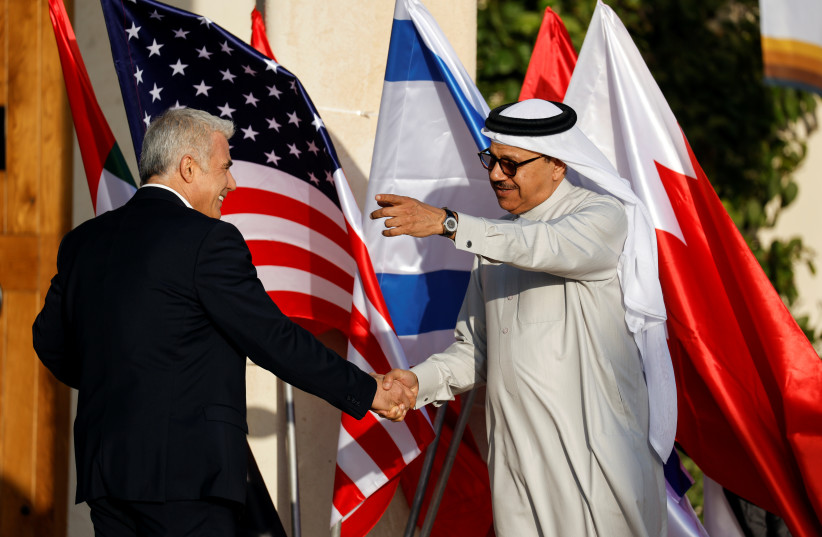A bloc of four Arab countries with 122 million people, all of which are peace partners of Israel, have joined together as part of a unique and large new partnership. Bahrain has joined the UAE, Egypt and Jordan in this new partnership, which will focus on a range of economic investments in the region.
This is designed to bolster Arab economic integration. These are among the key economies of the region. The fact that the countries all have peace with Israel illustrates new possibilities for the Abraham Accords because trade is the key building block of a new peace.
The National reported on Monday that “Bahrain has joined the Industrial Partnership for Sustainable Economic Development, boosting the industrial manufacturing value add of the alliance to more than $112.5 billion.”
The report says that Foreign Direct Investment “in the UAE, Egypt and Jordan reached $151 billion between 2016-2020, accounting for about 42% of new FDI in the Middle East. The total value of the countries’ exports stood at $433 billion in 2019, while imports amounted to approximately $399 billion, according to the statement.”
Key officials such as Egypt’s Minister of Transport, the UAE Minister of Industry and Advanced Technology, and Jordanian Minister of Industry attended the meeting this week alongside Zayed Al Zayani, Minister of Industry and Commerce of Bahrain.

“Bahrain, a major producer of raw aluminum and iron ore, boasts a strong industrial sector with more than 9,500 companies and 55,000 employees and $4.3 billion in industrial foreign direct investment. The partnership aims to establish large joint industrial projects, create job opportunities, contribute to increasing economic output, diversify the economies of the partner countries, support industrial production and increase exports,” the statement said, according to The National.
Global markets are in chaos due to the ramifications of COVID and now the Ukraine war; supply chains are threatened, gas prices are rising, and inflation and other sectors are affected as well. According to Dr. Nevin Gamea, Egypt’s Minister of Trade and Industry, this industrial partnership is vital in countering the economic impact of global crises and underscores the importance of private sector engagement in sustainable development for the Arab world.
Sustainable development is key
“The industrial partnership is expected to boost the gross domestic product of member countries by $809 billion,” The National reported. “The partnership identified five sectors of mutual interest, including petrochemicals; metals, minerals and downstream products; textiles; pharmaceuticals; and agriculture, food and fertilizers.”
This builds on a pact signed between the UAE, Egypt and Jordan in May. Egypt is also working with Jordan and Iraq on new initiatives.
“Bahrain is an ideal center for operations in the Arabian Gulf region.”
Al-Ain media
Al-Ain Media noted how important this is for food security in the region. Russia’s foreign minister visited Egypt on Sunday to discuss grain exports from Ukraine.
“The integrated industrial partnership will enable the four countries to enhance food and drug security in a manner that ensures the sustainability of the provision of goods and prevents any interruptions or imbalances and the resulting price distortions, and even stimulates growth and economic diversification, reduces import costs and facilitates finding alternative sources of goods,” Al-Ain noted.
The group will work on innovative solutions to expand agricultural production. This will include chemical industry investment, manufacturing capabilities, modern logistics, skilled labor and access to the global market that can be used to expand the production of alternative medicines and active ingredients, the reports say.
The countries will combine experiences in the field of pharmaceutical industries with the focus on expanding the manufacture of alternative medicines in Egypt, Jordan and the Emirates and Bahrain, reports say. Bahrain’s accession will increase the partnership’s contribution to the industrial value added of the Middle East from $106.26 billion to $112.56 billion. “Bahrain is an ideal center for operations in the Arabian Gulf region,” Al-Ain says.
